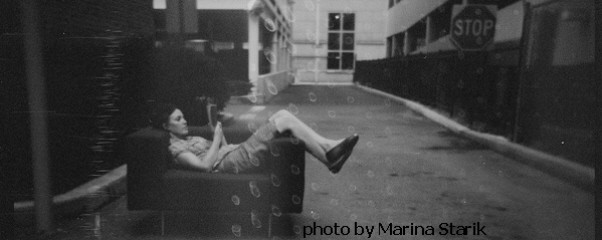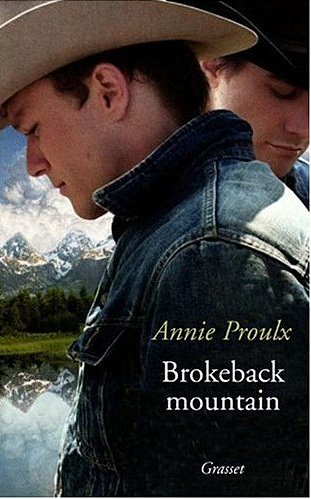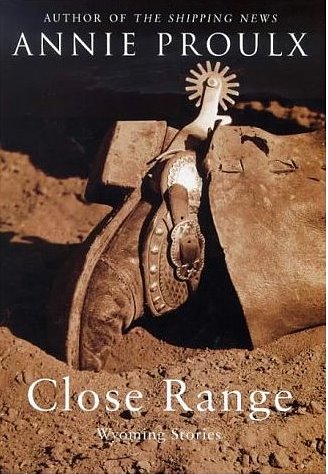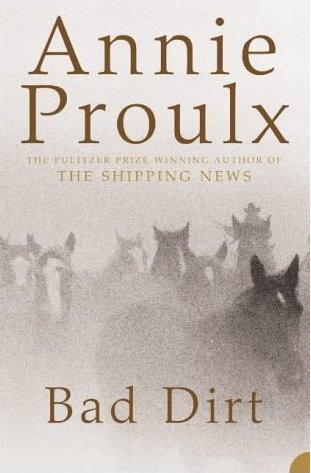
photo by Marina Starik
by Hayley Singer
I turn to the short fictions of Annie Proulx whenever I want to be swept along in hurly dust-devils of prose. Her stories read as vast mid-western myths or Prairie Tales, that hook right into the tensions between man and woman, human and animal, nature and culture.
Proulx’s collections: Heart Songs and Other Stories, Close Range: The Wyoming Stories, Bad Dirt, and Fine Just the Way It Is tear at the seams of the quotidian, and peek in at what squirms inside. Quite plainly, Annie Proulx writes the business of living on and with the land. But there is more than planting and ploughing at play in Proulx’s work; she conjures a mysticism of that which is so often considered to be mundane. There is a sacredness to be glimpsed within the detail of each story.
 So many people are familiar with Proulx’s stunning characters of Quoyle and Petal Bear from The Shipping News and of course Jack Twist and Ennes Del Mar from ‘Brokeback Mountain’. But her complex, foibled, and fleshy characters by no means end here. Within Proulx’s short fictions reside a number of mid-western eccentrics that stick out in my mind as vividly as if I’d met them at a corner store, or heard gossip about them on a train. Characters such as the childless Bill and Mizpah Fur from ‘The Sagebrush Kid’ or oversized and under-skilled Ottaline from ‘The Bunchgrass Edge of the World’ who, trapped on the family farm, retreats into her imagination and embarks on a romance with the farm’s ‘treacherous John Deer 4030’.
So many people are familiar with Proulx’s stunning characters of Quoyle and Petal Bear from The Shipping News and of course Jack Twist and Ennes Del Mar from ‘Brokeback Mountain’. But her complex, foibled, and fleshy characters by no means end here. Within Proulx’s short fictions reside a number of mid-western eccentrics that stick out in my mind as vividly as if I’d met them at a corner store, or heard gossip about them on a train. Characters such as the childless Bill and Mizpah Fur from ‘The Sagebrush Kid’ or oversized and under-skilled Ottaline from ‘The Bunchgrass Edge of the World’ who, trapped on the family farm, retreats into her imagination and embarks on a romance with the farm’s ‘treacherous John Deer 4030’.
Proulx’s narrative constructions display a unique mode of seeing and writing the world. The stories in Close Range contain some of those shimmering literary moments I have ingested and carry round with me as vividly as if I were a personal witness to them. While the stories aren’t complex to read, this by no means suggests that they aren’t complex thematically. Proulx uses the severity of the harsh mid-western farming landscape and unlikely characters to pose complex questions of identity, reality, truth, fantasy and mystery (and so much more). The imaginative framework for her entire oeuvre is set up at the opening of Close Range with a quote from a retired Wyoming rancher that rings clear and plain off the all but empty page as it states, ‘Reality’s never been of much use out here’. Indeed a reader can see the manifestations of this idea in the characters and plots that follow.
writing the world. The stories in Close Range contain some of those shimmering literary moments I have ingested and carry round with me as vividly as if I were a personal witness to them. While the stories aren’t complex to read, this by no means suggests that they aren’t complex thematically. Proulx uses the severity of the harsh mid-western farming landscape and unlikely characters to pose complex questions of identity, reality, truth, fantasy and mystery (and so much more). The imaginative framework for her entire oeuvre is set up at the opening of Close Range with a quote from a retired Wyoming rancher that rings clear and plain off the all but empty page as it states, ‘Reality’s never been of much use out here’. Indeed a reader can see the manifestations of this idea in the characters and plots that follow.
 To this end, Proulx invokes manifestations of the Fantastic, and essence of the ‘underlying strange’ within her work, in which landscapes act as ontological signifiers, objects are imbued with a quality of uncertainty, wavering like heat above tar, always with a potential to become Other. Her stories are articulated by long, hefty sentences; thick and chewy as rind. And there is no doubting that a heavy mid-western drawl is behind each and every one. Often, I find myself reading single sentences for a second and third time trying to decant the details; sentences that sketch whole landscapes, contextualise the daily grind of its people, its history, and often giving that bleak impression that the whole place is going no where, fast. In the opening of ‘People in Hell Just Want a Drink of Water’ Proulx gives just such a description that reads:
To this end, Proulx invokes manifestations of the Fantastic, and essence of the ‘underlying strange’ within her work, in which landscapes act as ontological signifiers, objects are imbued with a quality of uncertainty, wavering like heat above tar, always with a potential to become Other. Her stories are articulated by long, hefty sentences; thick and chewy as rind. And there is no doubting that a heavy mid-western drawl is behind each and every one. Often, I find myself reading single sentences for a second and third time trying to decant the details; sentences that sketch whole landscapes, contextualise the daily grind of its people, its history, and often giving that bleak impression that the whole place is going no where, fast. In the opening of ‘People in Hell Just Want a Drink of Water’ Proulx gives just such a description that reads:
‘Fences, cattle, roads, refineries, mines, gravel pits, traffic lights, graffiti’d celebration of athletic victory on bridge overpass, crust of blood on the Wal-Mart loading dock, the sun faded wreaths of plastic flowers marking death on the highway are ephemeral’.
With such a description Proulx takes us right to the end of the railroad, where everything is far, and nothing comes close. Just like the opening of ‘People in Hell’ many of Proulx’s short fictions read as inventories of small, dusty, dirt bowl towns; as if her imagination had turned out its pocket and the work came tumbling out.


Hi Hayley,
I just wanted to say that I really enjoyed your post, Annie Proulx is one of my favorite writers. I’m a new comer to this site and a soon to be contributor. I also liked reading some of your critical work on your own website, good luck with your Masters (I’m in the process of getting one too).
Anderson Blackacre
http://blackacre.posterous.com/